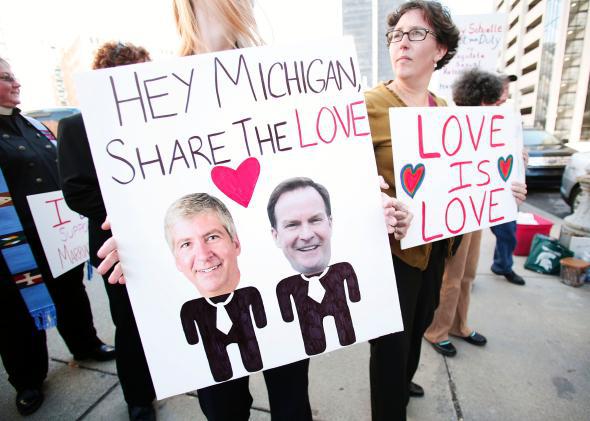In Michigan, all you need to change your last name is a marriage license. But when Michigan resident Jesse Sherman, who married his longtime partner Derek Melot in New York last October, presented his license to a state employee, his request was denied. The license might be valid in the eyes of New York and the federal government, Sherman was informed—but it wasn’t in Michigan. The Secretary of State’s office has confirmed this policy, noting that “anything that would lead the staff person to believe [a marriage certificate] is a same-sex marriage license” would result in denial of service.
In a sense, this result was inevitable. In 2004, Michigan voters enshrined homophobia in the state constitution, passing an amendment that forbade the state from legally recognizing any facet of a same-sex relationship. It’s logical, if perverse, that the amendment’s malevolence should trickle down to DMVs and bureaucrats, who are required by law to remind gay people that they are, officially, second-class citizens. If the constant parade of indignities caused by a ban like Michigan’s wasn’t clear to voters when they passed the amendment, it certainly is now.
But it seems unlikely that this kind of discrimination was what voters had in mind back in 2004. That, of course, was one of the darkest moments for gay rights in the United States, when Republicans (led by Ken Mehlman) pushed 11 states to ban gay marriage in order to boost voter turnout for Bush. The strategy worked: Bush was re-elected, and every state overwhelmingly passed its ban. At the time, few seriously expected any of the bans to fail—nor did most voters seriously consider the impact the measures would have on gay people’s everyday lives. Gay marriage was, at that point, an ideological bugaboo rather than a practical reality: Only one state allowed gay marriage, after all, so it was hard to imagine how a ban would do anything other than entrench the status quo.
That was before 18 states (and the District of Columbia) deemed same-sex unions “worthy of the dignity in the community equal with all other marriages,” before the Supreme Court praised “evolving understanding of the meaning of equality,” before a sitting president endorsed gay marriage, before the country tipped in its favor. Now, the actual effects of bans like Michigan’s are clear—and increasingly unconscionable to most Americans. These bans don’t only deny gay couples the basic dignity of marriage; they insult gay people in a thousand different ways, making basic activities like changing one’s name or entering the country fraught with confusion and potential embarrassment. Supporters of Michigan’s ban probably didn’t imagine what it would feel like to go to the DMV, to the hospital, to a customs agent, and have to explain that though you’re legally wed in part of the country, your own state insists on dissolving your marriage within its borders.
The good news, however, is that this entire affair represents the death throes of a moribund law. In October, a federal judge allowed a suit against Michigan’s anti-gay-marriage amendment to go forward, stating that the plaintiffs were “entitled to their day in court and they shall have it.” Most reports from the courtroom suggest that the judge seemed to favor the plaintiffs’ arguments. The trial will begin in February, and many observers expect the judge to strike down the ban altogether. (At that point, it might join the string of gay marriage cases jockeying for the Supreme Court’s attention.) So Jesse Sherman may become Jesse Melot as early as next month. But even that victory won’t erase the indignity he underwent when a single state bureaucrat informed him that, under Michigan law, his husband wasn’t his husband, but merely a legal stranger.
